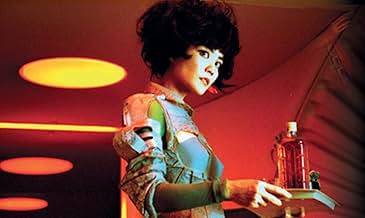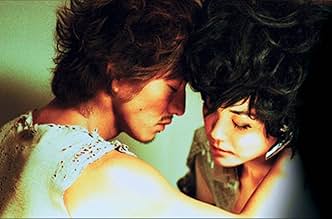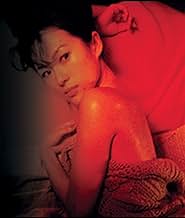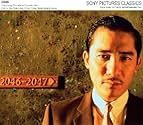2046
- 2004
- Tous publics
- 2h 9min
NOTE IMDb
7,4/10
63 k
MA NOTE
Plusieurs femmes entrent dans la vie d'un auteur de science-fiction pendant quelques années, après qu'il ait perdu la femme qu'il considérait comme son grand amour.Plusieurs femmes entrent dans la vie d'un auteur de science-fiction pendant quelques années, après qu'il ait perdu la femme qu'il considérait comme son grand amour.Plusieurs femmes entrent dans la vie d'un auteur de science-fiction pendant quelques années, après qu'il ait perdu la femme qu'il considérait comme son grand amour.
- Récompenses
- 38 victoires et 81 nominations au total
Tony Leung Chiu-wai
- Chow Mo-wan
- (as Tony Leung)
Jie Dong
- Wang Jie-wen
- (as Dong Jie)
Thongchai McIntyre
- Bird
- (as Bird Thongchai McIntyre)
Sien Cheung
- Party girl
- (as Sabrina Cheung)
Siu-Lung Ching
- Dabao
- (as Ching Siu-Lung)
Histoire
Le saviez-vous
- AnecdotesEach character speaks their own languages. Mr. Chow speaks Cantonese, Bai Ling speaks Mandarin, and Tak speaks Japanese, even when talking to each other. Even so, they seem to understand each other perfectly.
- Citations
Chow Mo Wan: Love is all a matter of timing. It's no good meeting the right person too soon or too late. If I'd lived in another time or place... my story might have had a very different ending.
- Versions alternativesChinese version is edited for sexuality in the Ziyi Zhang/Tony Leung love scenes.
- ConnexionsFeatured in Belas Artes: A Esquina do Cinema (2012)
- Bandes originales2046 Main Theme
(Percussion)
Composed and Arranged by Shigeru Umebayashi
Licensed To Virgin, EMI
(p) & © Block 2 Music Company Ltd.
Commentaire à la une
Review: 2046 (2004) By Ken Lee
Several years in the making and highly anticipated, _2046_ (2004) should pacify director Wong Kar Wai's fans, at least, for its end-of-an-era feel and look. At its core, this is a decidedly (or deceptively) simple movie, in spite of its fractured and non-linear narrative. It tells the tale of an emotionally wrecked man, Chow Mo Wan (played by Tony Leung), a reprised character from Wong's critically acclaimed earlier oeuver, _In the Mood for Love (2000)_, and the many beautiful women he keeps and fails to keep, in a time-space continuance that is laden with sepia-tinted memories: a monologue, if you will, of Chow's torrid love affairs, love spats, and the ensuing heartbreaks resulting, no doubt, from the pangs of a failed liaison Chow is trying to escape. It'd appear that the failed relation with Su Lizhen (Maggie Cheung) in _In the Mood for Love_, who has a "special appearance" in this film, has changed Chow irrevocably, which is key to understanding Chow's troubled soul.
But it is not a sequel necessarily, per se, to _In the Mood for Love_. This film can still be watched on its own, though it'd certainly help if you could link moments in _2046_ to the director's earlier works, for it's laden with jumbled continuity (take the character of Lulu, for example, first seen in _Days of Being Wild (1991)_), hidden meanings (read: Neo-Godardian) and other fun stuff, sorta an insider's joke, if you dig such esoteric things. But I digress. And it's been said that this is a culmination of all the previous filmic experience of director Wong (bordering on narcissism); hence its "end-of-an-era" feel and look is duly appreciated and a point well taken.
In _2046_, Chow's isn't an easily likable character owing to the frailty and the vagaries of his own personal emotions and peccadilloes, but that makes him only human and real, and his character, believable. Take the following exchange:
Su Lizhen (Gong Li) to Chow Mo Wan (Tony Leung): Do you know my past?
Professional gambler Su (she who is of the same name as that of Maggie's character in _In the Mood for Love_) asked Chow, dissonantly, questioning the latter essentially whether there is a future for the both of them, if he cannot forget his past. And it's for the same reason, or so we're led to believe, that Bai Ling (Zhang Ziyi) is left devastated, as Chow cannot treat her any differently from the scores of other women he's seeing; hence eliciting the following memorable line from Bai which I'm sure speaks to most of us one way or another:
Bai Ling (Zhang Ziyi) to Chow Mo Wan (Tony Leung): You may not like me. But I'll like you all the same.
What fools we are made by love. :)
Contrasting Chow as a man who dwells in the past and in need of closure to move on, Tak (Kimura Takuya) isn't ambiguous when it comes to matters of the heart.
Tak (Kimura Takuya) to Wang Jingwen (Faye Wong): I do not know what your answer may be. (I dread to know.) But I need to know.
Here is a man who is not afraid to love and says his love. And he needs to know if his love is unrequited. And in seeking happiness, the message seems to be that there is no other way. Now why does this remind me of all the sorry tales with which we are all-too-familiar with men-who-cannot-commit-or-decide? :) And so the film is thusly replete with impressions of repeated variations of the same theme: the pointlessness of returning to the past. Which is why we have the following line:
Bai Ling (Zhang Ziyi) to Chow Mo Wan (Tony Leung): Why can't it be like before? (The same reason why nobody returns on the 2046 train, in Chow's sci-fi novel of the same name. Seen in this light, it is also a double-entendre for director Wong: Why can't this film be like the one before in the form of _In the Mood for Love_? Where does he go from here?)
Those familiar with Wong's earlier works will notice his signatures throughout: quick cutting, slow motion, fast motion, freeze frames, black and white, tilt shots, color filters, neon-sign lighting, aided ably by three able cinematographers. Production value of _2046_ is expectedly top-notch. Music by Shigeru Umebayashi is haunting and sets the right mood. Zhang Suping (William Chang Suk Ping) does a wonderful job in creating an enrapturing atmosphere set in the late '60s.
How great it is, in an otherwise desolate world of unease, vulnerability, hopelessness, and pathos, we have directors such as Wong to feast our senses. Highly recommended.
Several years in the making and highly anticipated, _2046_ (2004) should pacify director Wong Kar Wai's fans, at least, for its end-of-an-era feel and look. At its core, this is a decidedly (or deceptively) simple movie, in spite of its fractured and non-linear narrative. It tells the tale of an emotionally wrecked man, Chow Mo Wan (played by Tony Leung), a reprised character from Wong's critically acclaimed earlier oeuver, _In the Mood for Love (2000)_, and the many beautiful women he keeps and fails to keep, in a time-space continuance that is laden with sepia-tinted memories: a monologue, if you will, of Chow's torrid love affairs, love spats, and the ensuing heartbreaks resulting, no doubt, from the pangs of a failed liaison Chow is trying to escape. It'd appear that the failed relation with Su Lizhen (Maggie Cheung) in _In the Mood for Love_, who has a "special appearance" in this film, has changed Chow irrevocably, which is key to understanding Chow's troubled soul.
But it is not a sequel necessarily, per se, to _In the Mood for Love_. This film can still be watched on its own, though it'd certainly help if you could link moments in _2046_ to the director's earlier works, for it's laden with jumbled continuity (take the character of Lulu, for example, first seen in _Days of Being Wild (1991)_), hidden meanings (read: Neo-Godardian) and other fun stuff, sorta an insider's joke, if you dig such esoteric things. But I digress. And it's been said that this is a culmination of all the previous filmic experience of director Wong (bordering on narcissism); hence its "end-of-an-era" feel and look is duly appreciated and a point well taken.
In _2046_, Chow's isn't an easily likable character owing to the frailty and the vagaries of his own personal emotions and peccadilloes, but that makes him only human and real, and his character, believable. Take the following exchange:
Su Lizhen (Gong Li) to Chow Mo Wan (Tony Leung): Do you know my past?
Professional gambler Su (she who is of the same name as that of Maggie's character in _In the Mood for Love_) asked Chow, dissonantly, questioning the latter essentially whether there is a future for the both of them, if he cannot forget his past. And it's for the same reason, or so we're led to believe, that Bai Ling (Zhang Ziyi) is left devastated, as Chow cannot treat her any differently from the scores of other women he's seeing; hence eliciting the following memorable line from Bai which I'm sure speaks to most of us one way or another:
Bai Ling (Zhang Ziyi) to Chow Mo Wan (Tony Leung): You may not like me. But I'll like you all the same.
What fools we are made by love. :)
Contrasting Chow as a man who dwells in the past and in need of closure to move on, Tak (Kimura Takuya) isn't ambiguous when it comes to matters of the heart.
Tak (Kimura Takuya) to Wang Jingwen (Faye Wong): I do not know what your answer may be. (I dread to know.) But I need to know.
Here is a man who is not afraid to love and says his love. And he needs to know if his love is unrequited. And in seeking happiness, the message seems to be that there is no other way. Now why does this remind me of all the sorry tales with which we are all-too-familiar with men-who-cannot-commit-or-decide? :) And so the film is thusly replete with impressions of repeated variations of the same theme: the pointlessness of returning to the past. Which is why we have the following line:
Bai Ling (Zhang Ziyi) to Chow Mo Wan (Tony Leung): Why can't it be like before? (The same reason why nobody returns on the 2046 train, in Chow's sci-fi novel of the same name. Seen in this light, it is also a double-entendre for director Wong: Why can't this film be like the one before in the form of _In the Mood for Love_? Where does he go from here?)
Those familiar with Wong's earlier works will notice his signatures throughout: quick cutting, slow motion, fast motion, freeze frames, black and white, tilt shots, color filters, neon-sign lighting, aided ably by three able cinematographers. Production value of _2046_ is expectedly top-notch. Music by Shigeru Umebayashi is haunting and sets the right mood. Zhang Suping (William Chang Suk Ping) does a wonderful job in creating an enrapturing atmosphere set in the late '60s.
How great it is, in an otherwise desolate world of unease, vulnerability, hopelessness, and pathos, we have directors such as Wong to feast our senses. Highly recommended.
Meilleurs choix
Connectez-vous pour évaluer et suivre la liste de favoris afin de recevoir des recommandations personnalisées
Détails
- Date de sortie
- Pays d’origine
- Sites officiels
- Langues
- Aussi connu sous le nom de
- Căn Phòng 2046
- Lieux de tournage
- Sociétés de production
- Voir plus de crédits d'entreprise sur IMDbPro
Box-office
- Budget
- 12 000 000 $US (estimé)
- Montant brut aux États-Unis et au Canada
- 1 444 588 $US
- Week-end de sortie aux États-Unis et au Canada
- 113 074 $US
- 7 août 2005
- Montant brut mondial
- 20 207 146 $US
- Durée2 heures 9 minutes
- Couleur
- Mixage
- Rapport de forme
- 2.35 : 1
Contribuer à cette page
Suggérer une modification ou ajouter du contenu manquant























